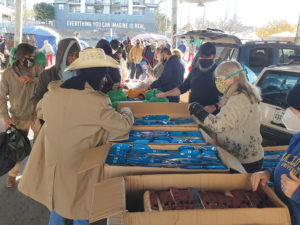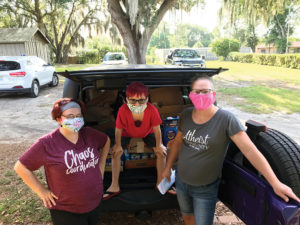Living our Values During Secular Week of Action April 30-May 9, 2021
 Austin Atheists Helping the Homeless gives away hundreds of bags of food and
other necessities
Austin Atheists Helping the Homeless gives away hundreds of bags of food and
other necessities AS HUMANISTS, working together for positive change and human progress is a core expression of our values. We are not alone. Throughout the United States, millions of people share in the desire to improve our nation for ourselves and our fellow community members, and those people show their dedication to this spirit of unity and hope through volunteer work every day. Secular Week of Action (SWoA) harnesses our shared commitment to making the world a better place by creating an opportunity to organize service events, connect new volunteers to impactful projects in their own towns and neighborhoods, and celebrate what we can achieve together when we dedicate ourselves to ethical action.
This inclusive, change-making week, taking place this year on April 30 through May 9, amplifies the good work human beings of all stripes are inspired to do daily. It also offers a relevant alternative to the National Day of Prayer, a day set aside in federal law for the people of the United States to “turn to God in prayer” on the first Thursday of May. As a pluralistic country, a national day that calls for a specific religious practice as an expression of civic virtue feels divisive and discriminatory to humanists and others who do not see prayer as the solution to the country’s challenges. Secular Week of Action provides a way for all Americans to participate in civic life through volunteerism, rather than only those whose religious practice includes prayer.
“It’s important for my community to be able to participate in expressions of civic pride and unity,” said Evan Clark, the executive director of Atheists United in Los Angeles. Last year, Atheists United held a Virtual 5K for SWoA benefiting the Emergency Relief Fund of the Black Skeptics of Los Angeles (a chapter of the American Humanist Association), and raised just over $2,000 for the cause. “While the Day of Prayer excludes us as atheists, the Week of Action allows us to express our secular civic values and have national impact and presence, which is especially important to us during this time of extreme Christian nationalism where dissenting voices are under assault.”

The Atheist Community of Polk County, an AHA affiliate, works with faith groups and nonreligious organizations to run a mobile food pantry
While Secular Week of Action started as a collaboration of secular organizations, people of faith also see the value in working together rather than praying apart. Reverend David Felten of Fountain Hills United Methodist Church in the suburbs of Phoenix, Arizona is often seen in government halls giving inclusive secular invocations and participating in interfaith events that embrace humanist values. Felten said, “As a Christian, I would much rather work with my secular friends in practical actions toward making the world a better place than promoting the kind of magical, prejudiced, and discriminatory ‘thoughts and prayers’ that animate the National Day of Prayer.”
A collective presence and impact are more important than ever as the country continues to reel from COVID-19 and its impacts on health, poverty, hunger, unemployment, and our communal mental well-being. As a result of the pandemic, the number of people experiencing homelessness and food insecurity has risen dramatically, while at the same time support has become harder to provide safely. Before 2020, on any given night in the U.S. more than 560,000 people experienced homelessness and at least 1.4 million people made use of emergency shelters or transitional housing each year. It is hard to know exactly how many more people experience homelessness and food insecurity in pandemic times, but numbers from June indicate that food insecurity more than doubled.
In response to this surge in need, Secular Week of Action’s theme this year will focus on alleviating hunger and homelessness, although all kinds of service projects are encouraged depending on the needs of the communities where groups are organizing. Nonreligious organizations all over the country are planning both virtual and in-person events including food deliveries, giveaways of health and hygiene items for unhoused people, food pantry donations, fundraisers for secular charities targeting these issues, blood drives, park and trail cleanups, and more. Groups can register their events and individuals can search for local activities on the Secular Week of Action website: www.weekofaction.org.
With scores of organizations participating last year and more planning events for 2021, Secular Week of Action is quickly becoming a meaningful, impactful tradition for humanists, atheists, nontheists, progressive people of faith, and others who share our values.
 “There are so many kinds of humanist outreach out there, but the one I think needs uplifting more is the promotion of direct service,” said Phil Session, a board member for Foundation Beyond Belief, which works with hundreds of volunteer teams to encourage local action all over the world. Session is also a lead coordinator with Austin Atheists Helping the Homeless, an organization that served 200+ unhoused people with bags of food for last year’s SWoA event. “Even in non-pandemic times, we are surrounded by our friends and neighbors experiencing food and nutrition insecurity, housing insecurity, and many more. Not only can we make an impact directly in the lives of those whom we serve, we also demonstrate and illustrate to others that we as humanists are just as caring, just as passionate, both willing and able to go out to make a difference.”
“There are so many kinds of humanist outreach out there, but the one I think needs uplifting more is the promotion of direct service,” said Phil Session, a board member for Foundation Beyond Belief, which works with hundreds of volunteer teams to encourage local action all over the world. Session is also a lead coordinator with Austin Atheists Helping the Homeless, an organization that served 200+ unhoused people with bags of food for last year’s SWoA event. “Even in non-pandemic times, we are surrounded by our friends and neighbors experiencing food and nutrition insecurity, housing insecurity, and many more. Not only can we make an impact directly in the lives of those whom we serve, we also demonstrate and illustrate to others that we as humanists are just as caring, just as passionate, both willing and able to go out to make a difference.”
In addition to the impact secular volunteers can have on issues like food insecurity and homelessness, SWoA raises the visibility of humanist, atheist, nontheist, and other secular communities and allows us to expand our outreach. Individuals whose values are aligned with humanism but are not familiar with our communities have an opportunity to learn about local groups and attend purpose-driven events to meet like-minded people. The week also provides a basis for interfaith-humanist collaboration to solve local challenges.
“The Secular Week of Action provides an opportunity for our group to bring added visibility to the community service work that we do year round,” said Sarah Ray, co-founder of the Atheist Community of Polk County (an affiliate of the American Humanist Association). That community joined forces with other local organizations last year to create a novel mobile food pantry in the wake of COVID-19. “Internally, it gives us a chance to motivate and inspire folks who may not already be active in this type of engagement to become more involved, if only for that week, knowing that some will connect with the mission and continue forward into ongoing service to the community.”
Making a difference virtually is also becoming much more feasible as communities have had time to adapt to new distancing needs during the pandemic. Virtual speaker series, Zoom fundraising events, citizen science activities, and other creative online concepts are all becoming part of the new norm for SWoA organizing.
“This past year has been difficult for so many people in the secular community because, with COVID-19, most of us weren’t able to spend time together or volunteer in person,” said Tory Roberg, Director of Government Affairs for the Secular Coalition for Arizona. Secular AZ’s more than 20 coalition organizations participate in a wide range of secular activism for SWoA and throughout the year. “But because there are many advocacy activities online through our coalition, and virtual service opportunities through citizen science sites like Zooniverse, the secular community was able to come together and express our civic spirit during the Secular Week of Action. It helped with people’s sense of isolation and showed the good work we can all do through action no matter what our religious viewpoints are.”
The aftermath of COVID-19 will linger long into the current decade. After we have recovered, the inequalities built into our social and political structures will continue to prescribe poverty to millions of individuals and families. Yet even as we face so much suffering and injustice, Secular Week of Action provides an opportunity for a social practice, rooted in hope, that addresses these challenges and builds a pathway toward a more humanist world.
“For me, this is the one life that we know, for sure, that we have to live, to love, to hold one another, and to leave an impression on the lives of others in our community,” said Session. “Secular Week of Action encourages groups to do just that. If this one life is all we have, then I will center my efforts to help ensure that the lives of others can be just a little bit better because they, too, have just this one life to live. Why not invest the time and effort it takes to help it be a little brighter if we can?”
Got two minutes?
If you want to participate in Secular Action Week but don’t have a lot of time, visit the AHA’s Humanist Action Headquarters. You can easily take action on the policies humanists care about, from the Do No Harm Act to evidence-based election reforms. It only takes one click of the mouse to let your members of Congress know where you stand on the issues. Learn more and take action now! americanhumanist.org/actionhq.
